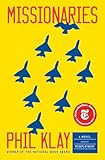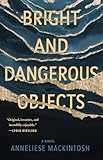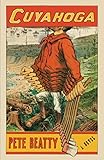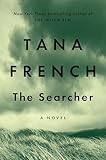Here’s a quick look at some notable books—new titles from the likes of Rumaan Alam, Phil Klay, Tana French, and more—that are publishing this week.
Want to learn more about upcoming titles? Then go read our most recent book preview. Want to help The Millions keep churning out great books coverage? Then become a member today.
Leave the World Behind by Rumaan Alam
 Here’s what Publishers Weekly had to say about Leave the World Behind: “In Alam’s spectacular and ominous latest (after That Kind of Mother), a family’s idyllic summer retreat coincides with global catastrophe. Amanda and Clay, married white Brooklynites with two children, rent a secluded house in the Hamptons for a summer vacation. Their ‘illusion of ownership’ is shattered when the house’s proprietors, G.H. and Ruth, an African American couple in their 60s, show up unannounced from New York City. Widespread blackouts have hit the East Coast, and G.H. and Ruth are seeking refuge in the beach house they’ve rented out. The returned owners are greeted with polite suspicion and simmering resentment: ‘It was torture, a home invasion without rape or guns,’ thinks Amanda. G.H. and Ruth, in turn, can’t help but wish their renters gone (‘G. H.’s familiar old fridge yielded nothing but surprise. He’d not have filled it with such things’). But over a couple days, they form an uneasy collective as a series of strange and increasingly menacing events herald cataclysmic change, from migrating herds of deer to the thunder of military jets roaring overhead. The omniscient narrator occasionally zooms out to provide snapshots of the wider chaotic world that are effective in their brevity. Though information is scarce, the signs of impending collapse—ecological and geopolitical—have been glaringly visible to the characters all along: ‘No one could plead ignorance that was not willful.’ This illuminating social novel offers piercing commentary on race, class and the luxurious mirage of safety, adding up to an all-too-plausible apocalyptic vision.”
Here’s what Publishers Weekly had to say about Leave the World Behind: “In Alam’s spectacular and ominous latest (after That Kind of Mother), a family’s idyllic summer retreat coincides with global catastrophe. Amanda and Clay, married white Brooklynites with two children, rent a secluded house in the Hamptons for a summer vacation. Their ‘illusion of ownership’ is shattered when the house’s proprietors, G.H. and Ruth, an African American couple in their 60s, show up unannounced from New York City. Widespread blackouts have hit the East Coast, and G.H. and Ruth are seeking refuge in the beach house they’ve rented out. The returned owners are greeted with polite suspicion and simmering resentment: ‘It was torture, a home invasion without rape or guns,’ thinks Amanda. G.H. and Ruth, in turn, can’t help but wish their renters gone (‘G. H.’s familiar old fridge yielded nothing but surprise. He’d not have filled it with such things’). But over a couple days, they form an uneasy collective as a series of strange and increasingly menacing events herald cataclysmic change, from migrating herds of deer to the thunder of military jets roaring overhead. The omniscient narrator occasionally zooms out to provide snapshots of the wider chaotic world that are effective in their brevity. Though information is scarce, the signs of impending collapse—ecological and geopolitical—have been glaringly visible to the characters all along: ‘No one could plead ignorance that was not willful.’ This illuminating social novel offers piercing commentary on race, class and the luxurious mirage of safety, adding up to an all-too-plausible apocalyptic vision.”
The Lost Writings by Franz Kafka (translated by Michael Hofmann)
 Here’s what Publishers Weekly had to say about The Lost Writings: “This delightful collection features dozens of untitled fragments, false starts, and unfinished work by Kafka, found and chosen by biographer Stach. In mostly untitled pieces, ranging from a few lines to a couple of pages, readers will find aphorisms (‘to a real angler no fish is ever really lost’), meditations on the myth of Prometheus and the eighth wonder of the world, fables about a loaf of bread that can’t be cut, a description of a shop without a front door, a mysterious chess game, an egg containing a misbegotten bird, and short works that anticipate some of Kafka’s masterpieces, including The Metamorphosis. Also on view are the kind of bureaucratic fever dreams associated with Kafka, along with mordant statements on mortality (‘You are forever speaking of death, and not dying’). Opening sentences such as ‘I was allowed to set foot in a strange garden’ and ‘The city resembles the sun,’ make the reader’s pulse heighten with the thrill of entering the space of great literature. This offers precisely the kind of fare Kafka enthusiasts would hope for from the legendary writer’s archives.”
Here’s what Publishers Weekly had to say about The Lost Writings: “This delightful collection features dozens of untitled fragments, false starts, and unfinished work by Kafka, found and chosen by biographer Stach. In mostly untitled pieces, ranging from a few lines to a couple of pages, readers will find aphorisms (‘to a real angler no fish is ever really lost’), meditations on the myth of Prometheus and the eighth wonder of the world, fables about a loaf of bread that can’t be cut, a description of a shop without a front door, a mysterious chess game, an egg containing a misbegotten bird, and short works that anticipate some of Kafka’s masterpieces, including The Metamorphosis. Also on view are the kind of bureaucratic fever dreams associated with Kafka, along with mordant statements on mortality (‘You are forever speaking of death, and not dying’). Opening sentences such as ‘I was allowed to set foot in a strange garden’ and ‘The city resembles the sun,’ make the reader’s pulse heighten with the thrill of entering the space of great literature. This offers precisely the kind of fare Kafka enthusiasts would hope for from the legendary writer’s archives.”
Missionaries by Phil Klay
 Here’s what Publishers Weekly had to say about Missionaries: “Klay’s ambitious debut novel (after the National Book Award–winning collection Redeployment) plunges the reader into war-torn Colombia, where allegiances are uncertain and tremendous violence is an everyday reality. The story follows the four characters: there is Abelito, a Colombian forcibly conscripted into a militia commanded by the infamous terrorist Jefferson, and who hopes to save the woman he loves from his murderous commandants. American journalist Lisette Marigny, meanwhile, is embedded in Afghanistan until she is dispatched to Bógota to report on gang activity, only to be kidnapped by guerrillas. En route from the Middle East is Mason, an Iraq War veteran and Special Forces medic reassigned to fight paramilitary narcos in Colombia, which he naively imagines will be a ‘good war.’ He befriends Juan Pablo, a weary commando who frets at being little more than a common mercenary and reflects on his early ambition to join the priesthood. Through these four protagonists, Klay unravels the complexity of interventionist American operations abroad, from Kabul to Medellín. While the novel suffers from a surfeit of tedious subplots and can feel overwhelmed by Klay’s exhaustive research, the prose is consistently staggering, whether in the characters’ moments of self-reflection or unflinching descriptions of brutality (‘A chainsaw appeared, and suddenly everyone who had watched, confused and amazed… knew what was about to happen’). Even though the whole thing doesn’t quite tie together, it’s quite a ride.”
Here’s what Publishers Weekly had to say about Missionaries: “Klay’s ambitious debut novel (after the National Book Award–winning collection Redeployment) plunges the reader into war-torn Colombia, where allegiances are uncertain and tremendous violence is an everyday reality. The story follows the four characters: there is Abelito, a Colombian forcibly conscripted into a militia commanded by the infamous terrorist Jefferson, and who hopes to save the woman he loves from his murderous commandants. American journalist Lisette Marigny, meanwhile, is embedded in Afghanistan until she is dispatched to Bógota to report on gang activity, only to be kidnapped by guerrillas. En route from the Middle East is Mason, an Iraq War veteran and Special Forces medic reassigned to fight paramilitary narcos in Colombia, which he naively imagines will be a ‘good war.’ He befriends Juan Pablo, a weary commando who frets at being little more than a common mercenary and reflects on his early ambition to join the priesthood. Through these four protagonists, Klay unravels the complexity of interventionist American operations abroad, from Kabul to Medellín. While the novel suffers from a surfeit of tedious subplots and can feel overwhelmed by Klay’s exhaustive research, the prose is consistently staggering, whether in the characters’ moments of self-reflection or unflinching descriptions of brutality (‘A chainsaw appeared, and suddenly everyone who had watched, confused and amazed… knew what was about to happen’). Even though the whole thing doesn’t quite tie together, it’s quite a ride.”
Bright and Dangerous Objects by Anneliese Mackintosh
 Here’s what Publishers Weekly had to say about Bright and Dangerous Objects: “British writer Mackintosh’s powerful U.S. debut explores a woman’s struggle between her desire to join a Mars resettlement program and stay on Earth to start a family. At the start of the novel, Solvig Dean, 37, is out stargazing with her boyfriend, James, on a scenic cliff in Cornwall. The opening line of dialogue (‘‘It’s incredible,’ I tell James. ‘I’m sitting here with you, but I’m looking light-years away’’) sets the tone for what follows: Solvig is an ambitious dreamer, while the plans of James, a tattoo artist, extend to nurturing a sourdough starter for the rest of his life. Solvig, a deep-sea diver for the oil industry, working 10-hour shifts on the ocean floor and away from home for months at a time, loves James, but she’s restless on land and in their relationship. After James tells Solvig about the Mars Project, Solvig is captivated by the prospect, but conflicted. With graceful prose and elegant metaphors, Mackintosh connects Solvig’s search for herself and desire for balance with her process of coming to terms with the loss of her mother. Solvig’s difficult choice is further informed by Mackintosh’s brilliant weaving in of a history of women in space. When Solvig finally makes her choice, the reader is left breathless, astounded by her courage. This is a deeply moving story about love, loss, and the strength it takes for women to realize their dreams.”
Here’s what Publishers Weekly had to say about Bright and Dangerous Objects: “British writer Mackintosh’s powerful U.S. debut explores a woman’s struggle between her desire to join a Mars resettlement program and stay on Earth to start a family. At the start of the novel, Solvig Dean, 37, is out stargazing with her boyfriend, James, on a scenic cliff in Cornwall. The opening line of dialogue (‘‘It’s incredible,’ I tell James. ‘I’m sitting here with you, but I’m looking light-years away’’) sets the tone for what follows: Solvig is an ambitious dreamer, while the plans of James, a tattoo artist, extend to nurturing a sourdough starter for the rest of his life. Solvig, a deep-sea diver for the oil industry, working 10-hour shifts on the ocean floor and away from home for months at a time, loves James, but she’s restless on land and in their relationship. After James tells Solvig about the Mars Project, Solvig is captivated by the prospect, but conflicted. With graceful prose and elegant metaphors, Mackintosh connects Solvig’s search for herself and desire for balance with her process of coming to terms with the loss of her mother. Solvig’s difficult choice is further informed by Mackintosh’s brilliant weaving in of a history of women in space. When Solvig finally makes her choice, the reader is left breathless, astounded by her courage. This is a deeply moving story about love, loss, and the strength it takes for women to realize their dreams.”
Cuyahoga by Pete Beatty
 Here’s what Publishers Weekly had to say about Cuyahoga: “Beatty’s inspired debut is an American tall tale in the 19th-century oral tradition. Living legend Big Son has wrestled forests and rivers into submission. But in Ohio City in 1837, he meets his greatest challenge to date when his true love, Cloe Inches, refuses to be his bride until he proves himself as a provider. He finds work building a bridge across the Cuyahoga River that will connect Cleveland with its rival, Ohio City. But after the bridge collapses, so, too, do Big Son’s fortunes. It is up to his brother, Medium Son, called Meed, to restore his reputation by creating an almanac of Big Son’s legendary feats. Meed, however, covets Cloe and is secretly jealous of the attention his older brother receives. Throw in a dandyish rival for Cloe’s affection and a gunpowder-toting demonstrator, and the stage is set for the biggest Big Son tale of all time. Narrated by Meed in a colloquial voice (about Big: ‘I do believe I could make a decent merchant for him as a foremost spirit of the times’), Beatty’s novel has echoes of Matthew Sharpe’s Jamestown and Hugh Nissenson’s The Tree of Life, employing language that thrusts the reader fully into the tumult of life on the American frontier. Like Big Son himself, this novel is an American original.”
Here’s what Publishers Weekly had to say about Cuyahoga: “Beatty’s inspired debut is an American tall tale in the 19th-century oral tradition. Living legend Big Son has wrestled forests and rivers into submission. But in Ohio City in 1837, he meets his greatest challenge to date when his true love, Cloe Inches, refuses to be his bride until he proves himself as a provider. He finds work building a bridge across the Cuyahoga River that will connect Cleveland with its rival, Ohio City. But after the bridge collapses, so, too, do Big Son’s fortunes. It is up to his brother, Medium Son, called Meed, to restore his reputation by creating an almanac of Big Son’s legendary feats. Meed, however, covets Cloe and is secretly jealous of the attention his older brother receives. Throw in a dandyish rival for Cloe’s affection and a gunpowder-toting demonstrator, and the stage is set for the biggest Big Son tale of all time. Narrated by Meed in a colloquial voice (about Big: ‘I do believe I could make a decent merchant for him as a foremost spirit of the times’), Beatty’s novel has echoes of Matthew Sharpe’s Jamestown and Hugh Nissenson’s The Tree of Life, employing language that thrusts the reader fully into the tumult of life on the American frontier. Like Big Son himself, this novel is an American original.”
The Searcher by Tana French
 Here’s what Publishers Weekly had to say about The Searcher: “After 25 years as a Chicago cop, Cal Hooper, the protagonist of this superb standalone from Edgar winner French (The Witch Elm), decided he needed a change. So he moved to a village in the West of Ireland, ‘no bigger than the little end of nothing,’ where people leave their doors unlocked. After three months, his prosaic new life ends when he’s sought out by 12-year-old Trey Reddy, who has learned of Hooper’s former profession. Trey fears something bad has happened to his 19-year-old brother, Brendan, who hasn’t been seen in about six months. Because their mother, Sheila, is convinced Brendan took off on his own, Trey hasn’t gone to the police, though the boy’s certain his brother wouldn’t have done that. Despite Hooper’s cynicism (‘Anyone could do anything,’ he thinks), he agrees to look into the matter, starting with questioning Sheila. The more Hooper digs, the more he finds that his new community conceals dark secrets. Insightful characterizations, even of minor figures, and a devastating reveal help make this a standout. Crime fiction fans won’t want to miss this one.”
Here’s what Publishers Weekly had to say about The Searcher: “After 25 years as a Chicago cop, Cal Hooper, the protagonist of this superb standalone from Edgar winner French (The Witch Elm), decided he needed a change. So he moved to a village in the West of Ireland, ‘no bigger than the little end of nothing,’ where people leave their doors unlocked. After three months, his prosaic new life ends when he’s sought out by 12-year-old Trey Reddy, who has learned of Hooper’s former profession. Trey fears something bad has happened to his 19-year-old brother, Brendan, who hasn’t been seen in about six months. Because their mother, Sheila, is convinced Brendan took off on his own, Trey hasn’t gone to the police, though the boy’s certain his brother wouldn’t have done that. Despite Hooper’s cynicism (‘Anyone could do anything,’ he thinks), he agrees to look into the matter, starting with questioning Sheila. The more Hooper digs, the more he finds that his new community conceals dark secrets. Insightful characterizations, even of minor figures, and a devastating reveal help make this a standout. Crime fiction fans won’t want to miss this one.”
Also on shelves this week: The Hole by Hiroko Oyamada (translated by David Boyd).










